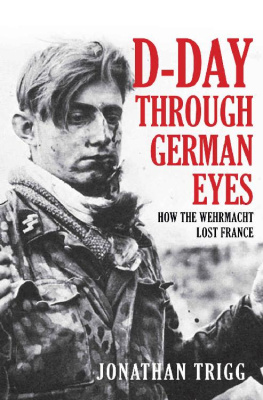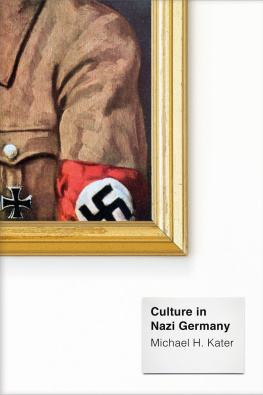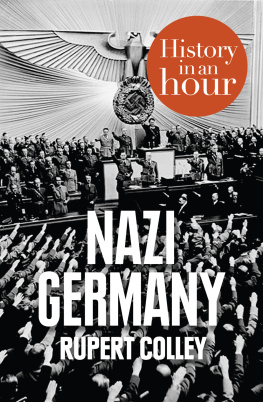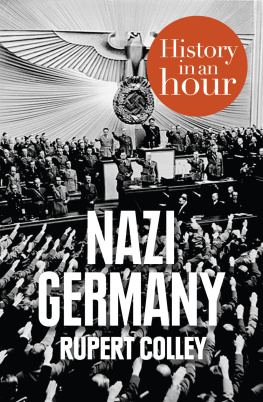Jonathan Trigg - To VE-Day Through German Eyes: The Final Defeat of Nazi Germany
Here you can read online Jonathan Trigg - To VE-Day Through German Eyes: The Final Defeat of Nazi Germany full text of the book (entire story) in english for free. Download pdf and epub, get meaning, cover and reviews about this ebook. year: 2020, publisher: Amberley Publishing, genre: History. Description of the work, (preface) as well as reviews are available. Best literature library LitArk.com created for fans of good reading and offers a wide selection of genres:
Romance novel
Science fiction
Adventure
Detective
Science
History
Home and family
Prose
Art
Politics
Computer
Non-fiction
Religion
Business
Children
Humor
Choose a favorite category and find really read worthwhile books. Enjoy immersion in the world of imagination, feel the emotions of the characters or learn something new for yourself, make an fascinating discovery.

- Book:To VE-Day Through German Eyes: The Final Defeat of Nazi Germany
- Author:
- Publisher:Amberley Publishing
- Genre:
- Year:2020
- Rating:3 / 5
- Favourites:Add to favourites
- Your mark:
- 60
- 1
- 2
- 3
- 4
- 5
To VE-Day Through German Eyes: The Final Defeat of Nazi Germany: summary, description and annotation
We offer to read an annotation, description, summary or preface (depends on what the author of the book "To VE-Day Through German Eyes: The Final Defeat of Nazi Germany" wrote himself). If you haven't found the necessary information about the book — write in the comments, we will try to find it.
To VE-Day Through German Eyes: The Final Defeat of Nazi Germany — read online for free the complete book (whole text) full work
Below is the text of the book, divided by pages. System saving the place of the last page read, allows you to conveniently read the book "To VE-Day Through German Eyes: The Final Defeat of Nazi Germany" online for free, without having to search again every time where you left off. Put a bookmark, and you can go to the page where you finished reading at any time.
Font size:
Interval:
Bookmark:



Half-title page: Along with local collaborators, on their surrender many hundreds of Antwerps German garrison were temporarily held in the cages of the citys zoo. (Authors collection)
Title page: German POWs march through Aachen after their surrender. Charlemagnes former capital was the first major German city to fall into Allied hands. (Authors collection)
First published 2020
Amberley Publishing
The Hill, Stroud
Gloucestershire, GL5 4EP
www.amberley-books.com
Copyright Jonathan Trigg, 2020
The right of Jonathan Trigg to be identified as the Author of this work has been asserted in accordance with the Copyrights, Designs and Patents Act 1988.
All rights reserved. No part of this book may be reprinted or reproduced or utilised in any form or by any electronic, mechanical or other means, now known or hereafter invented, including photocopying and recording, or in any information storage or retrieval system, without the permission in writing from the Publishers.
British Library Cataloguing in Publication Data.
A catalogue record for this book is available from the British Library.
ISBN 9781445699448 (HARDBACK)
ISBN 9781445699455 (eBOOK)
1 2 3 4 5 6 7 8 9 10
Typeset in 10.5pt on 13pt Sabon.
Typesetting by Aura Technology and Software Services, India.
Printed in the UK.
New Years Day 1945 in England was grim: cold, grey, rationing, the war, but human beings have an extraordinary way of dealing with such situations that sometimes involves new life. On that day in the solid working-class village of Dursley, Gloucestershire, Robert Keith Trigg made his first appearance. Skinny, small, the fourth of five children born to Kath, who worked in the local Listers factory, and Jack, who made Spitfire wings in nearby Filton. He was destined to attend the local school, get a job in the local factory, meet a local girl, and live out his life close to the house he was born in. Instead he chose a different path hard work, determination and sheer bloody-mindedness took him to the top of his profession, saw him travel the world, meet a girl from hundreds of miles away, and raise a brood of unruly boys. Hes a restless soul, forever looking for something to do, and then determined to do whatever that something is, and do it well. Sometimes impatient always caring he has taught me how to be a man, a husband and a father, and wherever I walk in life I know he walks beside me a strong hand on my shoulder, sometimes pushing, forever guiding so thank you Dad, for everything, and a happy seventy-fifth birthday; this book is for you.
This book has been written to coincide with the 75th anniversary of VE-Day and the end of the costliest war in Europes long history of costly wars. It follows on from the first book in the Through German Eyes series, D-Day Through German Eyes How the Wehrmacht Lost France, published last year as part of the 75th D-Day commemorations. This second volume picks up from the Allied victory at Falaise and the resultant headlong German retreat, and covers the last period of the war where Nazi Germany, caught in a vice between the forces of the western Allies and the Soviets, was finally defeated in a maelstrom of violence that left the Continent traumatised. Hardly an acre of land or a single home in Europe was left untouched by the war, with hundreds of millions of people suffering extraordinary hardship and grief; none more so than in the Balkans and the east what the historian Tim Snyder calls the bloodlands where the conflict was fought out with a brutality that even today defies comprehension. Having said that, this book seeks not to try and cover what is an almost limitless subject, but focuses largely on what was the Western Front, where the Anglo-Americans and their allies from Canada, France, Poland and various other nations, fought it out against Hitler and the Wehrmacht. This is not to demean in any way the importance of the Eastern Front and the indelible contribution of the Soviet Union to the defeat of Hitler and the Nazis, rather it is a choice of what story to focus on and its a choice Ive made.
Many of the same Caesars who faced each other in Normandy in the summer of 1944 would continue their struggle to the very end; the likes of von Rundstedt, Dietrich and Model on the German side, and Eisenhower, Montgomery, Bradley and Patton on the other, but as with the previous volume, this book is emphatically not about them though they figure prominently but about the view from the foxhole and the soldier sitting in it, often up to his knees in mud and water as he froze and suffered through what seemed interminable months before it was all finally over. It is those men (and sometimes women) whose stories inspired this book, and their words fill its pages. Unfortunately, many have passed away before this book could be published, but to one and all I say thank you.
A thank you as well to Jimmy McLeod for sharing his picture collection, and to my amazing wife Rachel and our wonderful children; Maddy and Jack.
During the war, most Germans used the term Russians to cover everyone in the now-extinct Soviet Unions Red Army, despite the multitude of nationalities and ethnic groups within it, and for ease, Ive left it like that. On place names many of these have changed since the war; most notably in the former Soviet Union and regions that have since changed in national ownership, for example, those parts of what was the Third Reich that are now Poland. I have given the place name at the time and then in brackets afterwards given the modern name; e.g. Breslau (modern day Wrocaw in Poland). On country names I have given them as they are now, so Belarus and not Byelorussia. I have tended to use the German nomenclature for their own military units e.g. the 88th Infantry Division is written as 88. ID, short for 88. Infanterie-Division, and for German ranks, Captain is Hauptmann etc. The exception is where the holders are Waffen-SS, and there Ive used that organisations own designation of SS-Hauptsturmfhrer and so on. There is a table of comparative ranks in the appendix.
As ever in any such work there are bound to be errors, my apologies, but where they have been made they are all my own and I ask the readers forbearance.
Adolf Hitler was dead. The war in Europe had finished. The old saying, Itll all be over by Christmas had come true. From the Courland peninsula in Latvia, down through central Germany all the way to Vienna and the Po Valley in northern Italy, millions of dejected German soldiers were trudging into captivity, even as a greater number of former forced labourers and POWs were walking in the opposite direction as they began their footsore journeys home. The Soviet Red Army sat camped on the east bank of the mighty Vistula river, its senior commanders angered at not having won the race to Berlin, but its rank and file still happily toasting victory with vats of vodka, while already expelling German civilians at gunpoint from the lands it now occupied and claimed as its own. The discovery of Hitlers concentration camps, and the horrors of the Holocaust, were showing the world the true nature of Nazism, and the hunt was now on for the men and women who had perpetrated what would become known as genocide and other crimes against humanity. The cost of victory had been high, but the dash across Europe by the Western Allies from Normandy, through Belgium, over the Rhine and into the Third Reichs very heart in the autumn of 1944 had dealt the death blow to Hitlers regime. Winter had come, but not in time to save the Nazis. Stalins decision to secure the Balkans and eastern Europe for his new communist empire had, paradoxically, saved Germany from a vengeful Soviet army, and allowed the Americans, British and Canadians to mop up the last pockets of Nazi diehards in Saxony and Silesia.
Font size:
Interval:
Bookmark:
Similar books «To VE-Day Through German Eyes: The Final Defeat of Nazi Germany»
Look at similar books to To VE-Day Through German Eyes: The Final Defeat of Nazi Germany. We have selected literature similar in name and meaning in the hope of providing readers with more options to find new, interesting, not yet read works.
Discussion, reviews of the book To VE-Day Through German Eyes: The Final Defeat of Nazi Germany and just readers' own opinions. Leave your comments, write what you think about the work, its meaning or the main characters. Specify what exactly you liked and what you didn't like, and why you think so.











